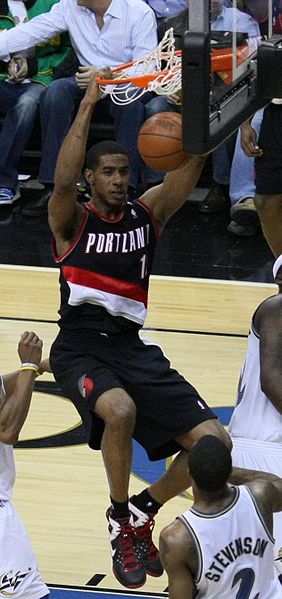
Image courtesy of Keith Allison/Wikimedia.
The NBA today is lucky enough to enjoy a glut of skilled power forwards, all coming in a variety of shapes and sizes with diverse skill sets and team roles. In terms of play style, four-men run the gamut from traditional bruisers like David West to floor-stretching finesse bigs like Ryan Anderson, and there is even a smattering of big-body small forwards—guys like Paul Pierce, Terrence Jones and Carmelo Anthony—who can shift down a spot, hold their own on ‘D,’ and wreak havoc on offense with their perimeter shooting and ball skills.
While the increasingly broad criteria for what constitutes a “power forward” has injected dynamism into the NBA’s on-court product, it has also created a logjam at the position in terms of All-Star and All-NBA voting. As players like Carmelo Anthony begin to fill the second forward slot on ballots with growing regularity, an attendant dip in appreciation for big men playing outside the confines of acknowledged, sexy archetypes has impacted the standing of these players in the NBA canon.
No one player suffers this burden more than LaMarcus Aldridge, and the fact that his talent goes unrecognized is a sad injustice.
If it was not already apparent after his 46 point, 18 rebound performance in Game 1, the 43-point barrage he submitted in Houston during Game 2 made it abundantly clear: LaMarcus Aldridge is an adult, and very good at the game.
An elite jump shooter, Aldridge is devastating on the pick-and-pop and serves as the lynchpin to Portland’s drive and kick game. When Damian Lillard probes the paint, opposing defenses think twice about collapsing, lest they abandon LMA to an unencumbered jumper practically preordained for splashdom.
Beyond that, Aldridge boasts a gorgeous finesse post game full of shimmies, shakes, stepbacks and fadeaways. At 6’11″ with a 7’1″ wingspan, his tremendous height and length allows him to elevate above the outstretched arms of leaping behemoths, while the gentle arc on his shot ensures that not even his most crowded attempts are foiled by the unseemly graze of an idle finger.
The man also rebounds like a demon. His 11.1 boards per game during the regular season were good for seventh best in the league, per ESPN.com, and he shouldered that burden while simultaneously serving as the primary scoring option for his team, scoring 23.2 points per game. Aldridge outrebounded renowned glass eaters like Zach Randolph, Anthony Davis, Tyson Chandler and Blake Griffin this season, while also producing more points than several lauded post scorers, among them DeMarcus Cousins, Al Jefferson and Dwight Howard.
Aldridge has a slim build and cannot bully defenders with his strength. This costs him the lunch-pail appeal of a Zach Randolph or David West, whose bruising persistence earns them a romanticized tough-guy reputation. The “wow!” factor that brings Blake Griffin and Anthony Davis their fame Aldridge similarly lacks, so while those players use their athletic gifts to lope and sore like Gazelle/Condor hybrids, LaMarcus is stuck making dogged rim runs, blocking out, and knocking down open shots with lethal consistency. It’s hard to romanticize or craft a narrative for Aldridge’s game because all he does is fulfill his role with maximal efficiency. It almost as if he were a role player so good he accidentally became a star.
In this series versus the Houston Rockets, then, it is fitting that when Aldridge is finally making himself visible with his prodigious scoring and strong play, the ways in which he’s doing it are wonderfully consistent with the overall profile of his game. He’s still operating on the left block, still canning jumpers from the elbow, still blocking shots with length and timing, not leaps—all that has changed is the frequency with which he does each thing. Well, that and the ridiculous degree of difficulty on the shots he’s making. Dude is in the zone.
That such herculean performances are the only way Aldridge can earn an iota of attention, though, is illustrative of his archetypal predicament. He has made All-NBA honors just once, in 2010-2011, when he was selected for the third team. Meanwhile, Blake Griffin has made back-to-back All-NBA second teams and is likely to earn them for a third straight year when the teams are announced in a few days. It’s befuddling, but not surprising. The more thrilling you are, the more you appear to contribute, and the more your play sticks in the mind of fans and award voters.
The name “Blake Griffin” conjures up images of highlight dunks, and the associations are immediate and tangible. “LaMarcus Aldridge,” on the other hand, brings to mind an ethereal sense of queasiness and dread—the phantasmal remnants of gut-punch jumpers of years past.
No doubt Aldridge would appreciate a little more recognition for his play, but somehow I also sense that he enjoys being the bearer of bad news—the guy who makes fans rub their temples and say, “how is this guy killing us?”
So, while this moment in the sun filled with praise and trendy pieces (like this one) flying the Aldridge flag in the name of underrated players everywhere is probably nice, there is a substantial chance that when he makes his inevitable return to the shadows, it won’t make a lick of difference to LaMarcus Aldridge.
Keep killing it, big fella.












